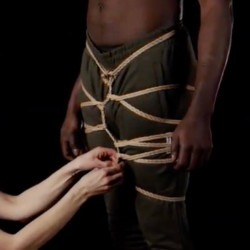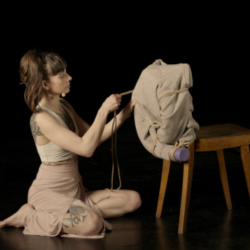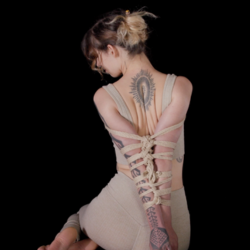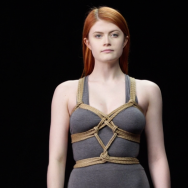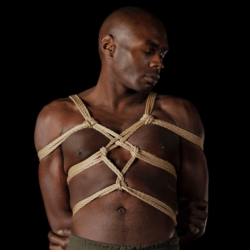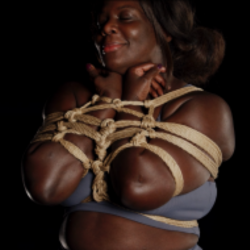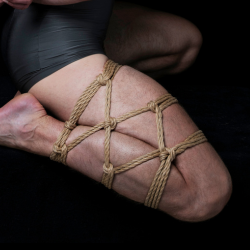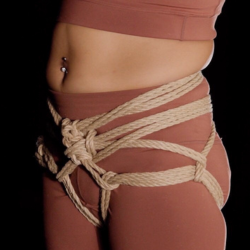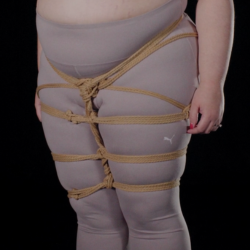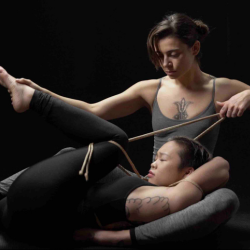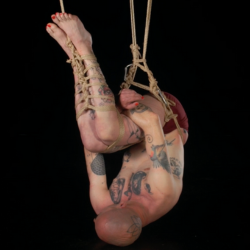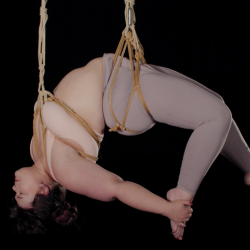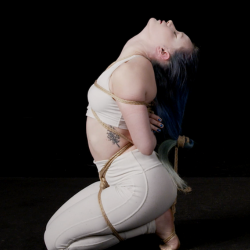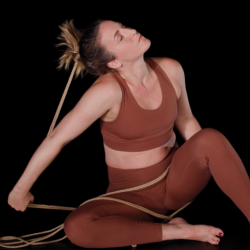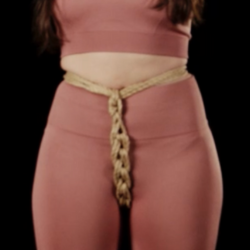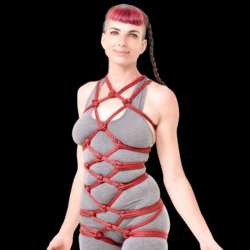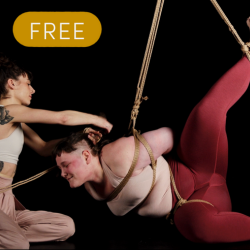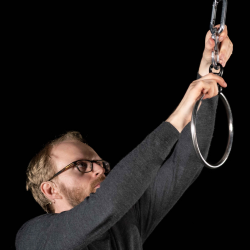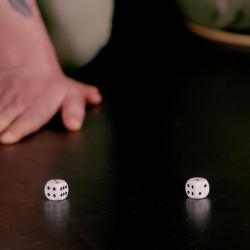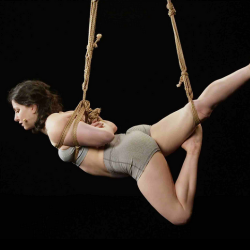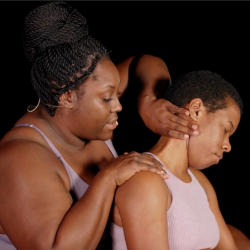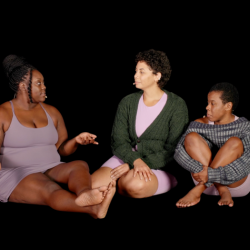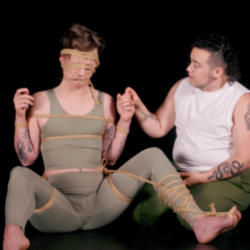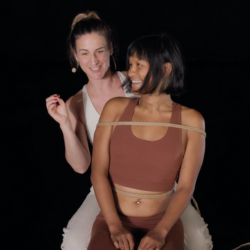EP 44
IVY LIMIEUX
One of Ivy's mission is to give people the freedom to find out who they are in rope. Join Ivy Limieux as they share their kink journey, explore community inclusivity, and discuss challenges faced by marginalized groups in alternative spaces. Gain insights on creating welcoming environments and fostering genuine connections.

Ivy Limieux is a sWitchy Sadistic VoxFox, joining the rope community in 2016. She believes that rope is as fluid and adaptable as the people who choose to participate, and that every desire to learn should be met with the opportunity to do so. She has taught/performed for organizations such as Twisted Windows, Dark Odyssey, Obsidian_LA, Black Rose Education, and Kink.com and is the co-producer of Folsom Street Faire's Rope Bondage Stage. Ivy is the currently retired founder and host of Kinky, Colorful, Conscious, a kinky POC roundtable, POC play party, SOUL and KinkPOC BAy Area Happy Hour. Find her on IG and FL @ivylimieux.
[00:00:07] Wicked Wren Hello to all my guys, gals and non-binary pals. Welcome to the Shibari Study Podcast. I'm your host, Wren. Shibari Study is an online learning resource offering video tutorials for beginners or advanced practitioners. Whether you're brand new to the world of shibari and needing to learn the basics, or a seasoned rigger or rope bottom seeking inspiration to push your practice to new places, there's something for you at shibaristudy.com. Today, I'm talking to Ivy Limieux. Ivy uses she/they pronouns and is the Bay area's sweetest (…). Ivy is an educator, a performer, and an event producer. How are you, Ivy?
[00:00:47] Ivy Limieux I'm great. Thanks for having me.
[00:00:49] Wicked Wren You're so welcome. So you were saying before we started recording that you're the Bay area's three-time (…) champion?
[00:01:01] Ivy Limieux Yes. The (…) game show is a long-standing event that happened – it used to happen at DNA lounge in the Cat club. And then during the pandemic, we went online. And I absolutely love Psycho Kitty and Miguel, who are the hosts there, just the sweetest people, and they're a lot of fun to hang out with and do this. And for pretty much all of the first couple of years of the pandemic, I got to participate once a month, and we would all meet on zoom and have a live show. It's now gone to in-person, and I can't participate because it happens on the same day that I teach, but I won the (…) game show three times, and it was a lot of fun because I got to meet a lot of cool, (…) people, and it really kind of... The way that this show is run, you get to, you get 60s to talk about a random (…) subject, and you can take it whichever way you want, but you're not allowed to repeat words. You're not allowed to deviate from the subject, and you're not allowed to hesitate for the 60s. If you do, someone can buzz in and take your spot and complete the challenge with whatever time they have left, and they get points for it.
[00:02:17] Wicked Wren What do you think makes really good (…)?
[00:02:21] Ivy Limieux I think that what makes really good (…) is first and foremost a nice, even, low voice. And, you have to be really creative, because you have to think about the person that you're talking to and what might turn them on. And of course, the challenge being that a lot of times this subject was so random and not like in your typical realm of (…). I think one time we had to talk about... It was a Halloween episode, and we were talking about all things like Halloween. So we were talking about like pumpkin guts or something like... So how do you make pumpkin guts (…)and dirty? I mean, it's already dirty, but how do you make it (…) without repeating the, without repeating any words?
[00:03:12] Wicked Wren It sounds like there's a confidence that comes with that.
[00:03:15] Ivy Limieux Yes. Sometimes you kind of have to – if you're not going the (…) route, you take the funny route. Because you're also in addition to trying to complete talking about the subject in the 60s, you're also kind of playing to the audience because ultimately the audience has an opportunity to vote for certain sections of the show that, that are worth a lot more points.
[00:03:42] Wicked Wren Was there anything that surprised you about this?
[00:03:47] Ivy Limieux I guess what really surprised me was the places that the other contestants brains would go when we were given something that was completely out of left field. I didn't... I didn't think that some of these things could be talked about for 60s, in such an e(…) way, but you really can, some of, they're so talented at, and, you know, making anything seem interesting and (…). There are a lot of times when we were just like, we're supposed to be buzzing in to steal from them, but and, you know, they're obviously breaking the rules, like repeating words or hesitating, even deviation too, but whatever they were saying was so captivating that you didn't want them to stop. And so we would let them talk for the 60s because it was so interesting what they were saying.
[00:04:40] Wicked Wren Do you think it's more about how you say things and how you present stuff versus what you actually say? Is there an attitude to it?
[00:04:49] Ivy Limieux Absolutely. If you say anything with confidence, and if you say anything believing that it's going to come off as (…) and fun, then it doesn't matter what you're saying. I think the best example of that is in the middle of the show we have a portion where everybody talks about the same subject, but it's a, it's bad phrasing. So you, you have to describe this subject or tell a story about the subject, and it has to be all wrong. So, like one time it was the G-spot. And so you couldn't actually talk about the G-spot, as in like the actual G-spot, but you had to talk – someone else, like, described it as a club. And it was so fun because we were talking about like, we described it as a club in the Castro, that people don't always know how to find.
[00:05:42] Wicked Wren I love it.
[00:05:43] Ivy Limieux Yeah. And honestly, I was, I was so captivated by I think it was [00:05:47]Rain deYray [0.3s] who was saying it, and she was describing it so well that I wanted to find the G-spot. I wanted to find this club because it sounded real, like an actual place.
[00:05:59] Wicked Wren Have you always been good at (…)
[00:06:01] Ivy Limieux No, I'm terrible at it. I'm actually really bad at it. All of my partners are like, You don't, you're not very good at this. And I think it's because I don't take myself so seriously. And I, I think that for me, when you're in intimate spaces, you have to be able to laugh because laughing is very vulnerable. And so I err on the side of, like, I want to have fun with you. I want to be able to laugh with you. Want to joke with you, and actually like they're like, No, I want like serious, (…) (…). And I'm like, I can kind of do that. But I also think this is a little absurd. So I'm going to make like, I might pepper in a joke here and there. And, and so it's not always like what they're looking for. So we don't really mash up that way.
[00:06:48] You always got to get a bit in there somewhere.
[00:06:50] Ivy Limieux Yeah, I have to get a bit in there somewhere. But at the very least I can take these stories and, I always won the (…) game show with my 60s story, I would just get the end. You have no holds barred, you can talk about whatever you want for 60s, and I would tell these little (…) vignettes that would always end in a cliffhanger, and, and people loved it.
[00:07:15] Wicked Wren I find that most people like having a bit of a constraint. They want to say, talk about this topic, describe the G-spot or something. But what you're saying is that when you were given full rein, you did well.
[00:07:28] Ivy Limieux Yes. Usually what would happen during, and just to, like, pull back the veil. It worked way better when I was in zoom because I had, like, the laptop in front of me. While we were having the competition, I would also be like, being inspired by the subject matters that everybody was talking about. And so I would start writing my story as I was, as I was listening to everybody else. So like, I would be like, Oh, I really like that subject, let me start writing about this or, Oh, I didn't get to finish, what I wanted to say about that subject during my 60s. So maybe I'll, maybe I'll elaborate on it later. And I started writing. And so then I would like, kind of have these little spark notes next to me of the story I wanted to tell during the 60s.
[00:08:15] Wicked Wren I'm going to cut this part out because I don't want your three crowns to be revoked.
[00:08:22] Ivy Limieux No, they won't be revoked! They know. Like, all of the, all of, all of them know about like how I would go about, because you, there's no rules. You don't, you don't have to, it doesn't have to be off the cuff. Some people would bring pre-made stories if they wanted, you know, but the challenge is that you have to say it out loud and it has to be 60s long.
[00:08:41] Wicked Wren That seems to be the easy part for you.
[00:08:43] Ivy Limieux Yeah, the, the easy part was saying it and making it 60s and making it end on a cliffhanger. Because normally I would write more than I had time to say.
[00:08:53] Wicked Wren I love it. I want to talk about having fun in scenes and being light and funny a little bit later, because I know that's how you approach rope and stuff. Before that, how did you find (…)? What was your entry point?
[00:09:07] Ivy Limieux Oh, I'm a Bay area native, born and raised San Francisco. I spent most of my childhood in the East Bay, though, for San Francisco exiles. But so (…) was kind of always a thing around. I know my parents when they grew up in San Francisco, like, my dad's cousins were all leather dykes, you know? So he would always be, go into all the gay bars and all the old lesbian bars that no longer exist. So it was kind of always there in the background. I found (…) online as a young adult, way too young to actually be looking at all the stuff that I was looking at. And I always knew that I had an interest of it. But for me, at the time, it was always this far off concept, this thing that was like, you'll figure it out when you leave home. You'll go back to San Francisco and you'll find the people that you need to find to explore that. It didn't actually happen that way. I had a little bit of sidetracks with, you know, marriage and school and other things like that. But I knew that it was always going to be there for me. And then after I left school, I moved back to the Bay. I had a friend, a childhood friend of mine who came out as (…), and I was like, Oh yeah, me too. And she was like, I've known you since I was 12 years old. How come we never talked about this? And I was like, because we lived in a regressive household that we didn't talk about sexuality. And so even with our friends, we didn't talk about these things, but we, we also used to write stories together, like RPG, like stories. And there was always these (…) undertones, but we never, like, breached that subject with each other. But I know after we talked, in her stories and also in my stories, when we would go off script on our own, they definitely took a (…) turn.
[00:11:02] Wicked Wren Isn't that so funny? I had a, my best friend growing up was also trans. We both were and we had no idea. And then years later we finally talked about it. Like this is insane, why didn't we talk about this? But we didn't have the words to say those things.
[00:11:18] Ivy Limieux Exactly. And it's so funny too, because a lot of my childhood friends were also queer and trans, and we never talked about it. I distinctly remember a moment with a friend of mine, where there was like a, there was like an argument that happened at prom, and then, my friend's date, he went into the bathroom. And then my friend, who at the time was female presenting, she/her pronouns like, went into the men's bathroom. And he asked them like, Oh, don't you feel uncomfortable here? And they'd, like, offhandedly said, No, I'm fine. This seems right. And then later, later on down the years comes out trans and then, you know, and well, I didn't come out as queer until I was 30. So... Yeah, it was always something that was there and in the background. And we would allude to it in like non-certain terms and kind of talk about it like as a joke, but... I was like, No, this is actually part of my life now.
[00:12:14] Wicked Wren We said earlier that you had family that were in (…). Do they know that you're (…) now?
[00:12:21] Ivy Limieux A lot of my family who are, were in that area since passed. So unfortunately, I wasn't able to share that with them. You know, being in San Francisco, growing up for them in, like, the 70s and 80s and early 90s, a lot of my family was devastated by, not only the war on drugs, but also the Aids pandemic. So unfortunately, I lost a lot of family members who probably could have been welcoming and guide me through all of that unfortunately. But my family doesn't... They kind of know, but they don't know. My sister knows. Like, all my sisters know, not the youngest, that one that's not old enough to know, but my older, the older sisters, because we're all in our 30s now, they all know. One sister is like, Cool, you do you, I don't really wanna hear about it. The other one is younger, a little bit younger, and actively in this community as well. We had this one moment where, like, we accidentally ended up at the same (…) party because our text messages got crossed, and it's like, Cool, I'm gonna be over here. You're going to be over there, and then we're never gonna look at each other, and then we're going to go in different rooms.
[00:13:38] Wicked Wren I do not have any siblings. But in a way, it's got to be kind of cool, because you know, that your sibling's safe and in a good place and things like that? And if there's anywhere to do it, being at a (…) party is the safest place to engage with multiple people, I suppose?
[00:13:54] Ivy Limieux Yeah. And, and you know, we're both poly and so like it's really great to like be able to talk to a sibling about these things and they, and they get it. But even the one that doesn't really want to, like, I can still talk to her. She just doesn't really have a point of reference to, as much, but they're all very open. My mom knows pretty much about everything. I showed her my website. And so I was like, Just so you know, like, this is what I'm doing. And she's just like, Okay, I don't want to hear about any of it anymore. But also at the same time, like, I know that my mom is like an old OG Femdom, so...
[00:14:30] Wicked Wren Really?
[00:14:31] Ivy Limieux Yeah, she was doing it when they didn't have a name for it, like an official name for it. So, like, she doesn't realize and she doesn't want to admit that, like, a lot of the skills that I learned, I kind of learned from her.
[00:14:44] Wicked Wren Like, you taught me how to do this, mom.
[00:14:46] Ivy Limieux Yeah. It's like you taught me. I learned it from you.
[00:14:48] Wicked Wren Yes.
[00:14:49] Ivy Limieux And then my dad, he, he has this. He knows that I, like, work for Folsom street events. And, because his birthday falls around Folsom, so, like, I usually I have to do something with him on a different day because I'm at Folsom for some day. And he knows I do something in rope, but he's like, he's kind of a as long as you're safe, I'm not going to ask. And you're not going to tell me kind of person. First time he kind of figured it out was like when I had a rope kit I was conditioning, and I was living with him at the time. I put it in the oven to melt the beeswax. And he happened to get up at like three in the morning to go in the kitchen and have a snack. And he knocks on my door and he's like, There's some rope in the oven. And I think it's done. And he's like, What's that for? And I'm, and my, my code word with him is 'Don't worry about it. So we say – if we're talking and we're asking questions to each other and we're kind of broaching on a subject that you probably don't want to know the answer to, we just tell each other, Don't worry about it.
[00:15:56] Wicked Wren Did that come about organically?
[00:15:58] Ivy Limieux Yeah, yeah. Originally that, that kind of [00:16:02]'Don't worry about it' [0.7s] had to do with like family history and, you know, we have a fraught family history, to be quite honest. So if I was ever curious and like, was trying to broach a subject that he wasn't ready to talk about, he would just say, Don't worry about it. So then as I became an adult and he would try to breach subjects like, like my marriage and my divorce and all that, and I would just be like, Don't worry about it. And then when it came to (…) things, he, he would start to ask and then suddenly, like, we've kind of hit a wall and I'm like, You really don't want to know, and I'd be like, Don't worry about. And he's like, Okay, okay, okay.
[00:16:34] Wicked Wren Love it. It's cool how those things happen.
[00:16:38] Ivy Limieux Yeah. And I think, yeah, he, he, he knows, but he doesn't really feel the need to have to like give an opinion about it.
[00:16:47] Wicked Wren How did you find rope? Where was that in your (…) journey?
[00:16:51] Ivy Limieux Oh geez, I can't think I always was interested in rope, but I think, the AOL days, the dial-up internet, when I was young. I think that that's where I really found an interest in rope, but didn't really know where, where to find and where to do it. So I was probably on some message board and ran across one where there was photos, and I think it was in a catchy, dinky photo that really caught my eye. And then I was like, What is that? Like, so, I found the rope, I found the rope photos. And then I started trying to explore and try to find more of it. And I couldn't really find much because I didn't have as much internet acumen as I do now. But I did find Midori, and I actually had found Midori when I was looking at corsets, because Midori used to model for Dark Garden and I found Dark Garden at like 14. And I loved Dark arden corsets, but I remember Midori's beautiful wedding corset photo, where she was modeling a wedding dress that they had. And then I found out Midori did rope, and I was like, okay, here Owe go. Corseting. Rope. These things are things that I want. And this person does both of them. And then I found out Midori is in San Francisco, and I'm like, Oh, she's right there, so... Circling back to, Oh, that's something that you'll be able to do when you leave your household. And I moved back to San Francisco when I'm 19, and that's where I'm going to go and find the people, and I knew someone, was like, Okay, I just need to find Midori, and then I can go and do the rope stuff.
[00:18:39] Wicked Wren Did you find Midori?
[00:18:41] Ivy Limieux I did not find Midori at first. Because Midori was not teaching on the level that was, like, I couldn't get a ticket to any of Midori's things, but I have since met Midori and... She is every bit of everything that I ever dreamed of. She's amazing. But I also like, nowadays, I'm more following her for her art than, more than anything else. But I'm forever grateful for, her information on rope, her, her book was one of the first books in English about Japanese rope bondage, and I read it voraciously.
[00:19:21] Wicked Wren Wow. When did you get rope for the first time? Did you self-tie or did you have someone else tie you? When did rope touch you first?
[00:19:32] Ivy Limieux That would be... I was like in my mid-twenties. I just left a very, very toxic work environment. A very intense work environment. You'll often hear me use a lot of, like, food and chef analogies in my teaching. Because I was a [00:19:47]professional chef [0.4s] for many, many years, when I left the professional chef industry, I had so much free time on my hands, and... I guess I needed something to do that would take up all of this time that I suddenly had. And I was like, Well, if there was any time that I could dedicate to actually learning this thing that I've always wanted to learn, it's this moment. And so it just so happened that, Blue from Voxbody, was hosting a women's tying, women's class at the Armory, 2016, 2017, something like that, probably 2016. And I was talking to a friend, who was like a work friend, but I was sharing, you know, my life with this, and, and I guess, I guess... Gosh, I just said I need to do this thing. And I don't have anybody to do it with. And my friend said, Okay, I'll do it with you. And so we went. We went to this class and we started learning. And then I was hooked. I was hooked from that moment on. And then she kind of fell off. She didn't really, she's like, I like it, but, like, I'm busy and I'm doing other things. And then I met somebody in the class who also didn't have a partner.
[00:21:12] Wicked Wren Oh, cool.
[00:21:13] Ivy Limieux Yeah. And so then we went to the whole series together, and then after that, I really wanted to keep up. But, you know, she, she and I, like, only occasionally would meet up to, like, practice and do things. And that was fine and then Blue that summer opened Voxbody. And so then I went to Voxbody. Oh my God, it took me so long to actually get into a rope studio, to be completely honest. I'm a very nervous person. Most people wouldn't know it. But like, it was easy to go to the series because you bought all the tickets and yeah. And then I knew I had somebody to go, to go with.
[00:21:49] Wicked Wren That is an interesting thing; for the series, you buy your seats, whereas a rope jam, it's way scarier. Actually, makes a lot of sense.
[00:22:00] Ivy Limieux Yeah. It's like going to a party where you don't have any friends. Yeah.
[00:22:03] Wicked Wren Yeah. It's kind of more of a social event than it is a tying event. Like, you can tie if you want, but it is kind of more of a social thing, which has a lot of pressure to it.
[00:22:16] Ivy Limieux Yes. And I think it was the social aspect that really made it very hard for me. And it's funny because now I tell people all the time, You just have to go, you just have to go. But I would buy tickets to jams, not really knowing what they were, whether it be at Voxbody or at other spaces. And then I wouldn't go, I wasted so much money, like buying tickets to things and then chickening out at the end. I would say that I, I, the first time I actually made it into a jam was at Voxbody and happened to be, like, early fall one. And I sat outside, when the jam started, I sat outside in my car for 45 minutes and I was like, I can't do this. I'm not, I can't, I can't go in here, I can't, I can't do this. And I was like talking to my now ex-husband. And I was like, I can't do it. And he's like, You're already there. It's not going to hurt for you to, like, walk through the door. If you don't like it, just leave. There's no requirement. Not like a class where like you go in the class starts, you do things and then you leave. It's so open you can come in whenever. He's like, If you don't like it, you can just walk out. He's like, Just, just, you know, slip out the back. And I was like, Okay, okay, okay. Like, this is, and he's just like, You've already done this twice. And you came home. He's like, Don't waste gas. You drove 40 minutes to do this. Like, you can do this. And then I went in and it was night. It was quiet. There was music playing in the background. It was a welcoming space, Blue's like, Hi, like I recognize you from the other, from the class series, you know, welcome, welcome, it's your first time here? I was like, Yeah, it's my first time. And she's like, well, you know, gave me the rundown on the space. I saw people tying, I saw people chatting. And then she goes, Oh yeah, you know, we're celebrating a birthday today too. So there's cake. Please feel free to have some tea and cake. And you know, the best thing you can do to bribe me is give me, give me some cake.
[00:24:10] Wicked Wren Give a girl some cake.
[00:24:12] Ivy Limieux And I was like, Okay, I might be able to stay just long enough to eat a slice of cake. And I did. Like, I ate a slice of cake. I had a cup of tea. I don't think I talked to anybody. I just watched, and then I left.
[00:24:29] Wicked Wren I want to talk about events and that barrier, because I think that that is a huge barrier for a lot of people. Before we get there, I do want to talk more about your early progression into learning. Did you use online resources at all?
[00:24:47] Ivy Limieux When I first started, there were very few online resources. I came into rope at a very interesting time. When that progression into online learning didn't happen, it very much was, it was very much a you had to know somebody who knew somebody to get into it, or you had to find something that was advertised online that would kind of give you a description of what you had to go in. When I learned, when I first thought about, you will be learning single-column and double-column ties in this class, I thought I had to bring like, poles. To tie a single-column tie on.
[00:25:23] Wicked Wren Got it.
[00:25:24] Ivy Limieux That was my idea of what a single-column tie was, because I would google single-column tie and there wouldn't be anything that came up.
[00:25:31] Wicked Wren Got it.
[00:25:33] Wicked Wren So we didn't have online resources when I came in. There was very, it was very limited and there definitely wasn't any video or pictures. It was usually in text description. And that was because a lot of people were very insular about the information that was being disseminated online. It very much was if you don't learn in person, you don't learn at all.
[00:25:52] Wicked Wren Well. Yeah. Yeah, and we're lucky to see that change a lot. And I think that that's a good thing. Obviously online does not replace in-person, but online resources like Shibari Study or something like that. Really great to supplement your learning.
[00:26:13] Wicked Wren Absolutely. It's a great supplement to your in-person learning, and it's been very interesting to see how online progressions have, progressed. All this because, I mean, now I feel like we are spoiled for information online.
[00:26:28] Wicked Wren Yeah.
[00:26:29] Ivy Limieux The resources online here were not available to us when we first, when I first started. Yeah.
[00:26:36] Ivy Limieux You do event production. That's a huge part of your make up, if you will. And you just described a lot of anxiety around going to an event. And my curiosity is, have you found ways to take that barrier and bring it down to make it... It's not that Vox wasn't an inviting space. There was just a lot of unknown. And you were afraid. And I think a lot of people feel that. [00:27:05]What tactics can we do to make people feel like they can walk through the door? [5.7s]
[00:27:13] Ivy Limieux Oh, I feel like it's, it's really hard to get people to get out. Like, especially if you've got it in your mind that, like, I can't do this thing. It's definitely a mind-over-matter thing. But I feel like there are a lot of smaller things that we can do to make people more comfortable with the bigger events. For me, getting people in the door for things that were less charged socially, is what ultimately led to people being more comfortable to go into things that were a lot more charged. And I would say like munches and happy hours. Everyone says, Oh, you should go to munch, you should go to happy hour or something like that. For me, a lot of my anxiety is about the social part. But, so for me, I just, I if I can put it in my mind that I'm going to this social event and it's work. So I'm posting, I'm promoting, I'm doing these things that, that for me, helps me have the energy and the wherewithal to get into those social spaces with less anxiety. But for people who are coming in, I think it really is about finding a friend, somebody to go with you, like you need an emotional support friend if you are nervous.
[00:28:27] Wicked Wren Yes.
[00:28:28] Ivy Limieux And encouraging people to bring their friends, even if their friend isn't necessarily interested in these things, can help. And also having, my, I started, (…), colorful, conscious I think 2017. And it was a discussion group. So there was no play there. There was no, there was nothing that, it wasn't a (…) party. It wasn't a rope jam. It was literally a you were going to come to meet like minded people. It was a BIPOC only group. So it was all people who were of all races, nationalities and ages. It was, it was a completely BIPOC only space. And you were going to come and talk. And if you don't want to talk, you can eat because there's a lot of food there. You can eat or, and if you don't want to, if you don't want to, you can just listen. So it was it was a space where there wasn't the anxiety around, Do I have to perform? Because when people think of play parties or (…) parties, something that they're like, they don't want to go in there because they're like, What if somebody asks me to to do something I'm not comfortable doing? But in a, in a talk space, in a roundtable discussion, you can just be. You can sit there, you can talk, you can listen, you can eat or you can walk away. You can leave. It brought so many people in.
[00:29:54] Ivy Limieux What were some ways that you started conversations?
[00:29:59] Ivy Limieux It really was about, the only thing that I really required in my, in KCC, (…), colorful, conscious was I'm going to go around the circle, and I'd love you to introduce yourself, your pronouns and what's on your mind today. When you (…) and I said, Just just give me a sentence, a word or something, and I would start writing it all down. And the the way that I formatted (…), colorful, conscious, it was very much determined what we would talk about by the people who were coming in and what was going on. So, of course, we always had like a lot of people turn out and wanting to have something to say whenever there was a local event. Like Folsom, Dark Odyssey, anything like that, but like, when I started to notice that a lot of people had the same things on their mind, I was like, Okay, so like, I hear a lot of you are really, having strong opinions about your experiences at Folsom this last weekend. Like, do we want to open up the discussion to start talking about Folsom? And then there'll always be, you know, a long pause, a silence, because no one wants to be the first person to say anything. But ultimately there'd be like one person who said, I have something to say and they would, like, ask a question, or they would talk about their experience or say something, and then that would cause someone else to talk. And then, you know, and, and then it would the conversation would just continue to keep rolling. And then people as, as the conversation was going, it was very casual and people started to feel like they were, you know, having a chat amongst friends. And so they felt like they could really voice their opinions. And from that, so many other wonderful things happened.
[00:31:40] Ivy Limieux Are there any standout things that you can share from that group? Because you said after Folsom, a lot of people have thoughts on that experience, and I would just be so curious what those thoughts were. And...
[00:31:59] Ivy Limieux Oh, yeah. So KCC once again was a BIPOC only space, and that was one of the containers that we used in order to make people feel comfortable walking out. Because they wanted a space where they didn't have to, to be honest, as a person of color in a primarily white-dominated, (…) space, the 'Who is going to be there' is, is very much a barrier to entry. Because we don't feel safe as much as people say that. Oh, this is a welcoming space. It's not. It really isn't. So the biggest takeaway that I could remember from the Folsom conversations was we didn't feel comfortable walking into a giant open-air fair where there are thousands of white people and we are the only POC that we can see down the street. And so then the conversation would go to, Okay, if we are going to be the only POC people walking down the street, are we going by ourselves or are we going in a group? Oh, we want to go in a group. Who else wants to go? What time do you want to go and how can we meet? Oh, look, now we're having a brunch together with a bunch of other people. Oh, this is great. Let's do this again. Now it's turned into a munch. Now it's turned into a happy hour. Oh, let's throw a party with everybody. And it would just kind of snowball out. And I think that the biggest takeaway from the Folsom conversations was we want to see more people of color on the stage, in the crowd, all together, being loud and proud and out about their (…). And then... If you want that to see that, how do you facilitate that? And if you are not the person who's going to facilitate that, what feedback do you want to give to the people who are. And then if you don't have the resources, [00:33:49]who in the group has the resources? [1.0s]
[00:33:51] Wicked Wren Yeah. [00:33:52]The how you facilitate that question is the hardest one, because I find a lot of times when there's marginalized groups and it's an event that is focused on a marginalized group. [13.3s] I – like if it's something around transness or something like that, I sometimes get more afraid in those areas because I find that people are setting up these parameters and they're essentially saying, Hey, you're different. Come, come over here in this circle. And that's scary a lot of the times to me, because people mean well, but it's not done... In a very good way.
[00:34:34] Ivy Limieux Yeah. I think that's actually really important to, to address, because I think a lot of people want to. You're right. They mean well, but if you're not part of that group, you can't do that for them. And that's also why KCC was invented as well. Because Blue and I got together. Blue reached out to me after, we used to have these before jam talks and discussions. It was when I, in that discussion actually came out as queer. But I also had said offhandedly, about like, challenges, challenges to entry. And I said, you know, I know when I'm walking into a space at this point that I'm probably going to be one of the only black people in the room. Right? And even then, I'm light-skinned. I'm mixed. So, like, it's a, I have a lot of privilege there. And I know that for me, it's probably going to be a lot easier for somebody else. And Blue reached out to me and she said, you know, I hear what you, I heard what you said. And it's been something that's been on my mind. Really important that, you know, she's just like, I'm very aware that we are primarily white space at this point, and that's what the community is. And she goes, I want to actively work on how that can change.
[00:35:51] Wicked Wren Yeah.
[00:35:52] Ivy Limieux And I got together with her and she's just like, Well, here's what I think should happen. And I was like, No. I was like, That's all well and good. However, like the, the, the foundation that you're working off of is not the foundation that's the reality for most black people coming into this space. Like, I understand you want to jam, but we have to take a step back and look at the community and what their needs are. And the only way we can do that is to ask them what they need and ask them what they want. [00:36:20]So if you don't have buy-in from the community that you're trying to serve, and they have to feel empowered to do what they want to do for them, then it's just kind of a lot of lip service. [12.7s]
[00:36:35] Wicked Wren I was at an event and I can't remember who said this, but somebody was talking and she was like, The music is even not focused around, like, black folks. It's like Drowning Pool and all this in a dungeon. And it's like, everything is so, so, so white-focused. And you said buy-in from the community, and if you don't have that, then you don't have anything.
[00:36:59] Ivy Limieux Yeah, especially black people. We don't give a lot of, we don't give a lot of people second chances. We can't afford it. It's very emotionally trying and traumatic for us to give a chance. So like the reason why we as black people will not even step in the door unless we know who's going to be there, is because there is so much energy that we have to use to protect ourselves and then to, like, navigate these spaces that, like nobody else understands. Like all of the, all the energy it takes to actually, you know, step in the room. And so something as simple as having music that we can relate to is, is really important, because these are small steps that you can take to make us feel more welcome. And so like I know at my parties we always have food. Like, not just, not just cheese and crackers. We have a spread. And that's what my parties were known for. Like, I remember the day that like, I went to a non-BIPOC only party and suddenly there was more food. And I had gone to that party before and there was no food, and it was because people were coming out of my parties and telling other people, Oh, you need to go to this party because the music is good, people are welcoming. And they had a whole ass spread. We had dinner. Like, and that was because that's what I wanted. That's what I knew I wanted because I go, my upbringing was if you go to a party, any type of party, baby shower, birthday party, house party, you are going to feed your people. And so food is really important to us culturally. And so I was like, Why can't I have that at a play party? If you don't want to eat, that's fine, but don't come, don't invite me and starve me out.
[00:38:42] Wicked Wren Yeah. Yeah. Yeah. White people are cut up a pop tart in six ways and they're like, Is this, this is good for everybody?
[00:38:50] Ivy Limieux Yeah. Like, yeah. Don't get me wrong, I love me some cheese and crackers, but like, I have a charcuterie plate. I have a cheese board, I have (…), I have, I mean, we had all sorts of, we had skewers. We had, we had chips, we had salsa, we had like, we had a, we had whole meals. We have whole meals. Now, we don't, we kind of dial it back a little bit now because food is very expensive and it's like a lot. And also based on like what people eat and don't eat. But like when, when my party came out, we had food and everybody was in an uproar about it because they're like, Oh my God, this is amazing. It's not something I ever thought I could ask for. And then suddenly everybody else is like, Oh, we should do that.
[00:39:32] Wicked Wren Have you seen Captain Daddy serve spreads at the bank?
[00:39:36] Ivy Limieux Oh, I was there for the New Year's Party of the century. Oh my God, that, I remember. I was talking about it for a while and them saying, Oh, I'm going to have a grazing table. And I was like, what does that mean? And then seeing it being built and then just walking around it and the smorgasbord that it was like, I don't think that, to be honest, there has not been a single party that I've been to since that party in 2019 that has ever compared. Especially on the food level. Like, I was like, I've been blown out of the water.
[00:40:15] Wicked Wren I have never seen food in that way in such a loving way, I suppose, because I'm sure your parties are just like this. But the Bank is my home rope space, so I know it. But the ways that the food's all laid out, and it's all things that people actually want to eat and engage, and it's where conversations happen. People can gather around that and actually have good food. And it's not a Walmart old cheese plate that no one particularly wants.
[00:40:50] Ivy Limieux It was incredibly thoughtful. And it was, you're right, it was, there was a lot of work and thought process that was put into the way it was designed, and the fact that there were very few utensils. Pre-COVID. So like we people could share things a lot more, but like the fact that there were very few utensils and plates because it was designed for you to reach in with your hands and to put whatever it was directly into your mouth. As a culinarian, I can appreciate that so much because everything was so appetizing and laid out. But also the act of eating is (…), the act of feeding somebody else, the act of, for me personally, the act of watching somebody eat something that you've created has always been incredibly (…) and (…) in my brain.
[00:41:40] Wicked Wren It's so funny you say that because sharing food is community. That's what people do.
[00:41:48] Ivy Limieux It's incredibly culturally significant for me, too.
[00:41:52] Wicked Wren One of my favorite books, a chef wrote it. She has a restaurant called Prune, and she was traveling in an area that she didn't speak the language, but someone took her in and then just started cooking an egg for her and a lot of olive oil and fry an egg, and then just put it on the plate and then gave it to her, and she ate it. And it's, she said that it's so cool that they didn't ask, how do you want the egg? Do you want egg? Do you want oil? Do you want this? It's like, just sit down and eat and someone just cook for her and even ask if she was hungry. Food is very, very intimate.
[00:42:25] Ivy Limieux Oh yes. And you can add a lot of dynamic to it too. Like I do. I like to add dynamic just like if I, if I get really close to you at some point, if we are going to like have some type of (…) scene or something like that, there's a very well possibility, like if we get to a level of intimacy, I'm probably going to cook a meal for you. And I'm going to sit there and I'm going to intently watch you as you eat it, which is very intimidating for a lot of people, but I enjoy it very much. It's very much a power dynamic.
[00:42:56] Wicked Wren I love it. I want to bring up something you said early on, and you were talking about teaching, and you said something I thought was awesome. [00:43:04]You said you want to give people the freedom to find out who they are in rope. [5.9s] And that is the opposite of most people in education. Most people say, I'm going to teach you this thing and you're going to do it, but you're coming from an approach of, I'm going to equip you to find out who you are.
[00:43:26] Ivy Limieux Yes. For me, I always mention to people rope is like water to me. And that can be taken in so many ways philosophically, scientifically, like water is something that you need to survive, right. And rope is something that we need to survive in some cases. But also water takes on so many different forms. It's one of those few things in science, it's like, yes, liquid, gas, solid, but rope is the same way. Rope is incredibly versatile, and because of its versatility, I do not believe that there is one true way to teach it. I think that there is a lot of conversation right now about schools of rope and styles of teaching and how to teach. But at the end of the day, because rope is so multifaceted, there has to be freedom in the way people learn rope and there has to be freedom in expression. So I think that it's very easy to get into the technical part of it. And so like, I feel like there's a lot of agreement around 'Here's how you teach the safety and technical aspects of it'. That we can agree on. But when it comes to how people connect through the medium of rope, it's incredibly difficult to teach people that, because none of us are coming from the same foundation of life experience. You have to take into account where people, how people are approaching rope, as a self-tier, as a partner tie and, and only their lived experience is going to inform that. So if... I like to use the term like we are all people. Shining flashlights in the dark. And you could be standing right next to someone in a dark room and shining a flashlight on something you see in the room, and you can describe it to that person, and they say, Okay, and they can shine their flashlight on it, too. But ultimately, those two flashlights are coming from two different places as you stand next to each other. And so those perspectives are always going to be slightly different, even if that person stands right where you were standing and shines the flashlight at an object in the room, it's still going to be slightly different because they have a different height. They might be holding the flashlight slightly differently. So to understand that, like these perspectives of people and their lived experiences inform how they do rope, I can't teach you everything. You have to figure it out on your own so I can give you a starting off point. But at some point, I have to let you go. I have to give you the freedom to go and try something on your own and figure out if it works for you. And a lot of times, I hate to say it, a lot of times a lot of teachers want to interrupt that process. And they want to guide it a little bit more than they really should. And I think it can interrupt that, that, it interrupts someone's rope journey to interrupt them too many times.
[00:46:40] Wicked Wren Why do you think teachers want to interrupt?
[00:46:44] Ivy Limieux I think that there's a fear that there's a very valid fear that, if you don't interrupt what you might think is a bad habit that is forming, that then that will be solidified in, in that person, and then you will then have to re-, like break that down and retrain it. But I think that when you interrupt that part of the process, you're interrupting their own personal like troubleshooting process as they try to figure it out.
[00:47:12] Wicked Wren Sounds like that growth is really important for people learning.
[00:47:16] Ivy Limieux Yes. It's really important for people. And like I said, this comes from my culinary background, too. [00:47:22]It's really important for people to mess up. It's really important for people to try something and not get it right. [5.8s] It's really important for them to say, Okay, this didn't work. How, where did I go wrong? Or where can I do something different? And if we are as instructors are interrupting that process, then they like, lose their place. Then they have to back up and go over again. And sometimes you have to let them go through it and then try something different. And of course, if you're seeing them struggling more and more and more, you can come in and give a suggestion, but don't do it for them. Like don't show them, don't show them the way out. Just point them in the direction of the door so they can then find the door.
[00:48:14] Wicked Wren What were your early obstacles?
[00:48:19] Ivy Limieux Some of my earliest obstacles were finding partners. Once again, very shy person. My ex-husband at the time, was not interested in rope at all. So I didn't have an intimate partner who I could tie with. I didn't have any friends in this community who were interested in rope. I had a lot of friends in the greater (…) community, who were interested in things, but, like, they, they were not interested in rope at all. So finding people to tie with meant that, I really had to put myself out there in a way that I wasn't comfortable with at the time. I'm still not comfortable with, to be completely honest. So I started off as a self-tier. I was like, Okay, if I can't find somebody to tie with consistently, I'm going to tie myself. That way I can learn the things. And then maybe when somebody comes along who wants to tie with me, I can tie with them. The, one of the unique challenges was at the time, there was a lot of discourse and conversation around, [00:49:14]is rope (…) or is rope platonic? [3.0s] And I found a unique challenge in that I came in as a married person. And so there was this assumption that the potential for (…) was off the table. It wasn't, but nobody asked that. It was, Oh, Ivy's married, so back off. So even if I did kind of ask somebody, Hey, would you like to tie some time? They were like, Thanks, but no thanks. And to be honest, it's a little chip on my shoulder. I still remember everybody who reached out to me, who was not interested in tying with me before they found out I was getting a divorce. So they're all on my (…) list. I, I'm still nice to them. I'm still cordial with everybody. But, like, yes, I did not tie with any of those people.
[00:50:06] Wicked Wren But you remember.
[00:50:07] Ivy Limieux Like, back then, you didn't want me. Now I'm hot and you all about me? Oh, no.
[00:50:12] Wicked Wren Iit's like, You can't have me now.
[00:50:14] Ivy Limieux Nope. Not interested. So... Yeah, so finding partners was the hardest part. But I think that there's a lot you can learn about yourself as you are learning to tie or be tied when you self-tie, that you can then bring into a partner and modality, if you were still seeking partners. Even as a bottom too. Self-tie. Fill that rope on your body and start to develop who you are with rope on your body? And then when you find somebody who is also willing to go on that journey with you, you'll have something to, you'll have a little bit more of a foundation to bring to that conversation.
[00:50:51] Wicked Wren It's amazing. Amazing. I could literally keep talking to you for another hour, but we're going to do podcast episode two very soon, I promise. Where can people find you?
[00:51:06] Ivy Limieux You can usually find me a Voxbody. That's usually where I'm at in person. Online, I'm on Instagram @ivylimieux. I also have a website because I am a part-time (…), and I do do rope in my sessions. www.theropekinktress.com. And you can always email me through the website as well.
[00:51:26] Wicked Wren Amazing. Thank you so much for being on. Really appreciate it.
[00:51:30] Ivy Limieux Thank you so much. That was fun.


